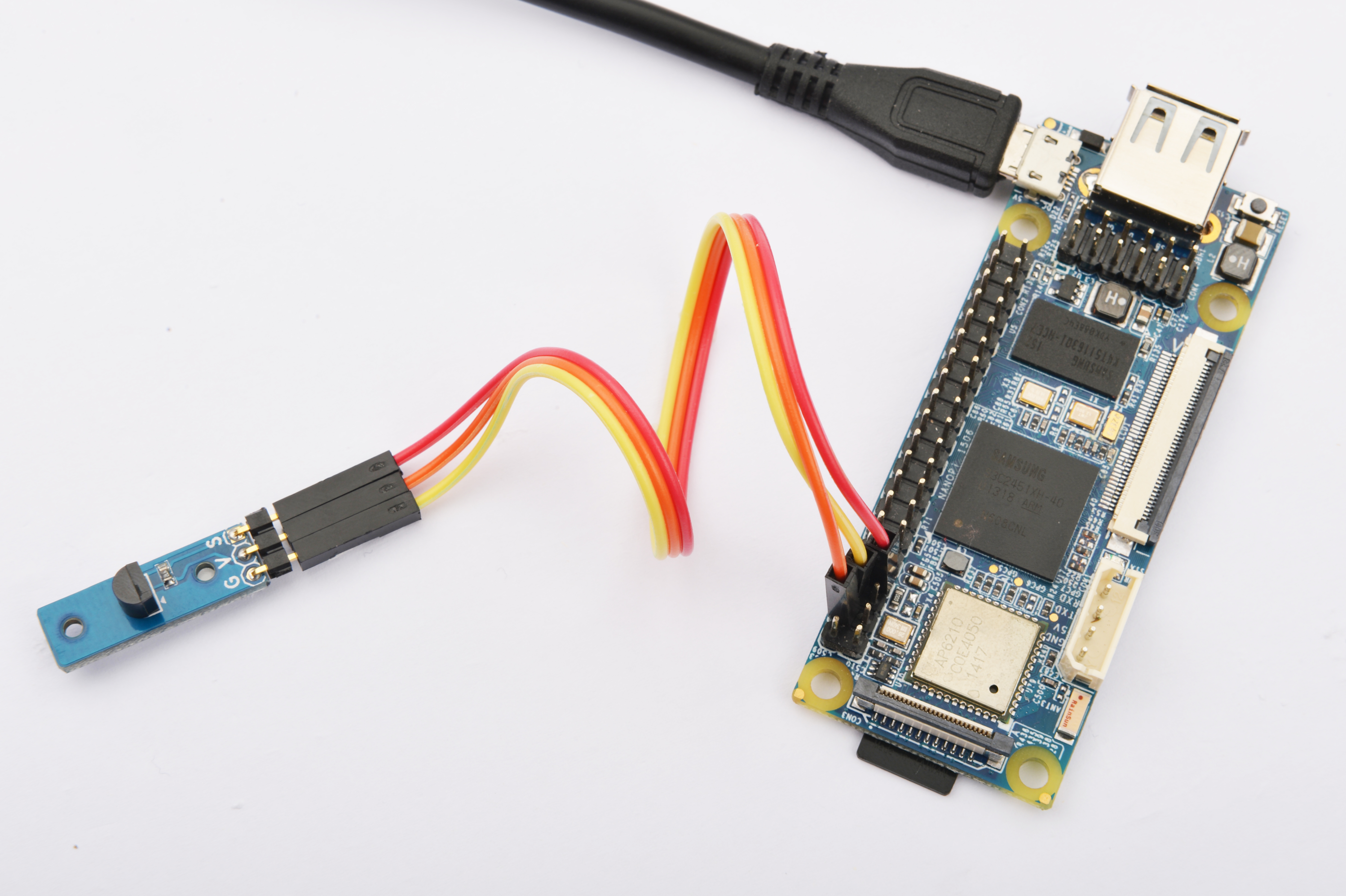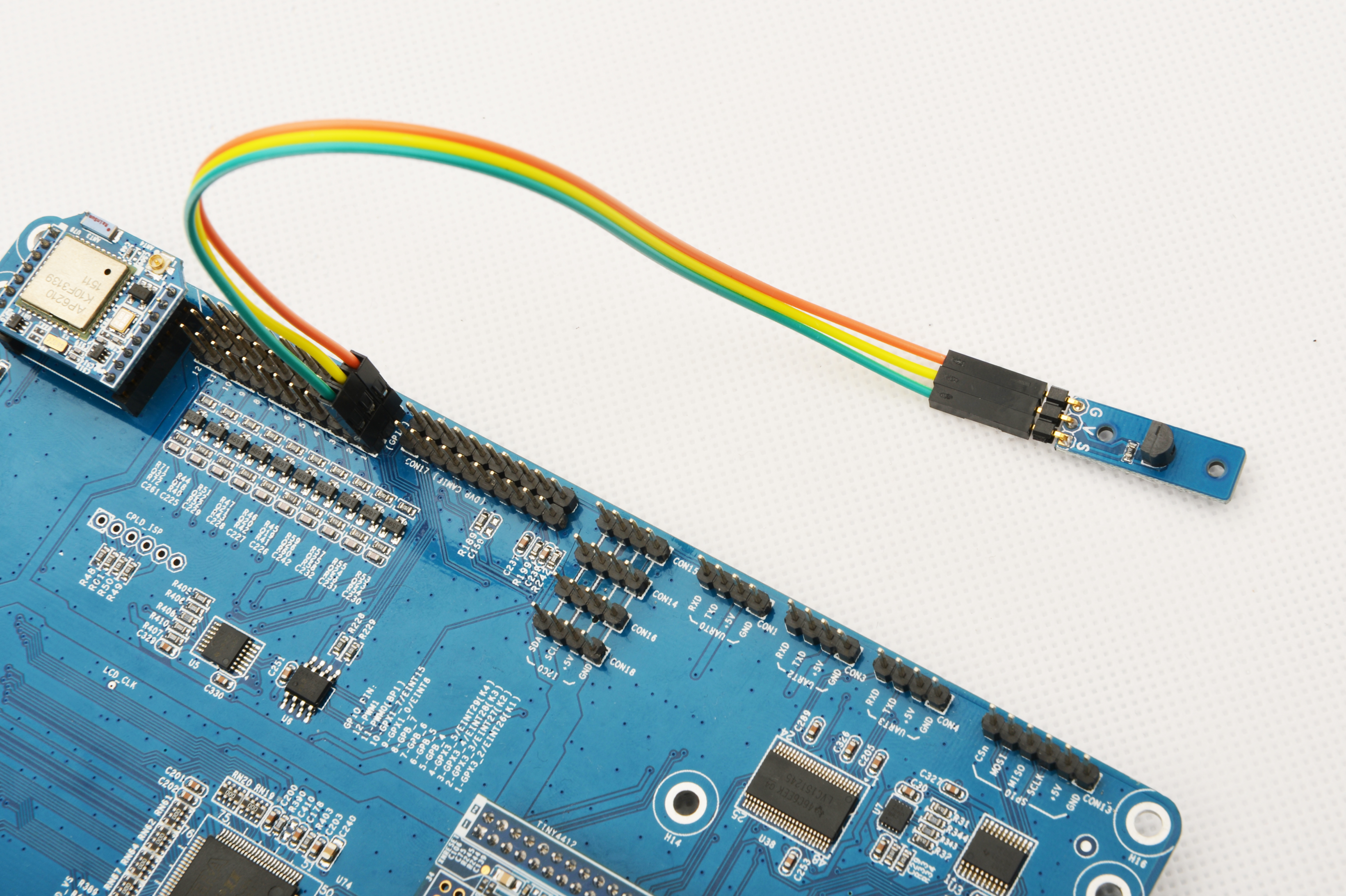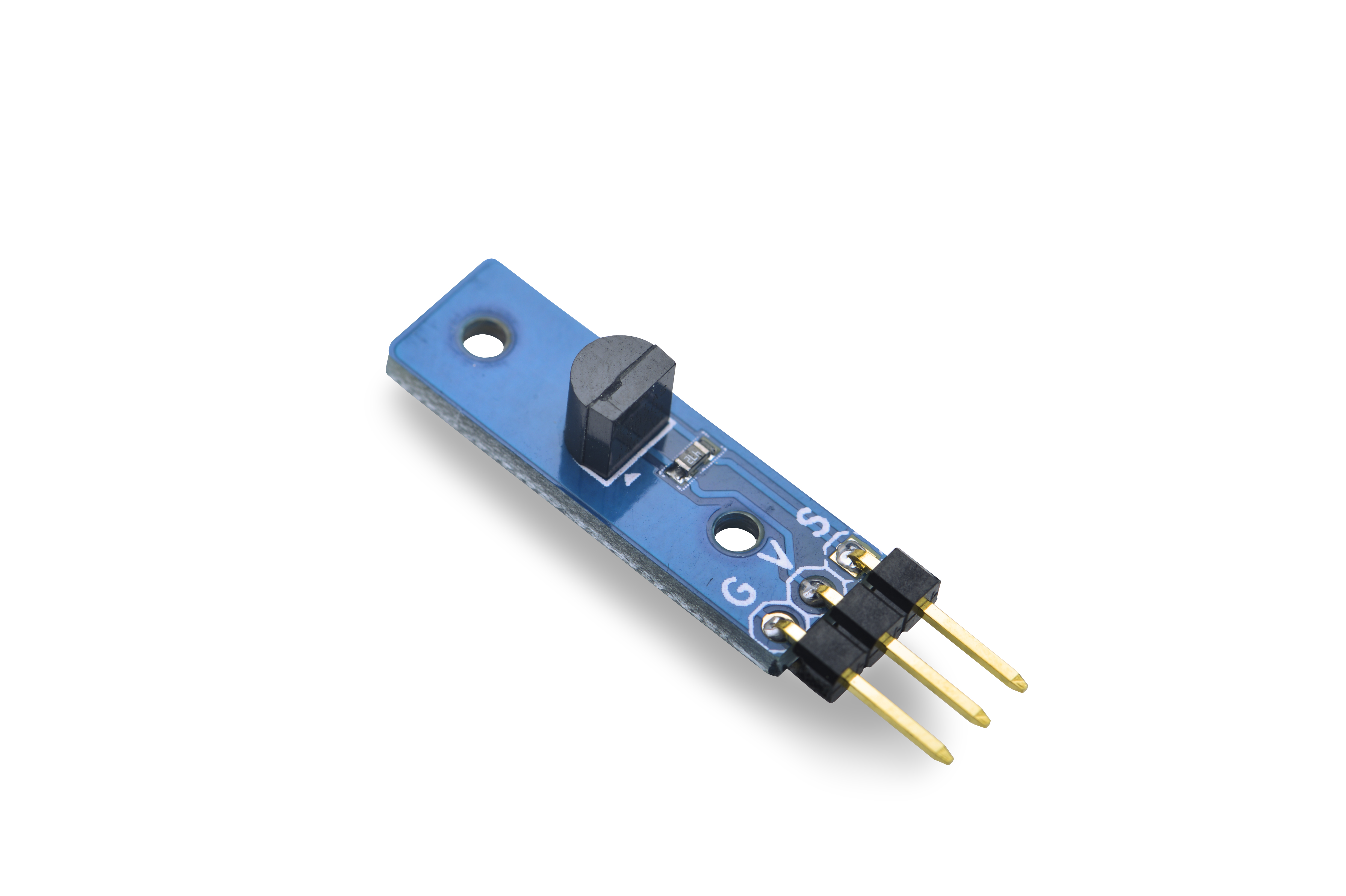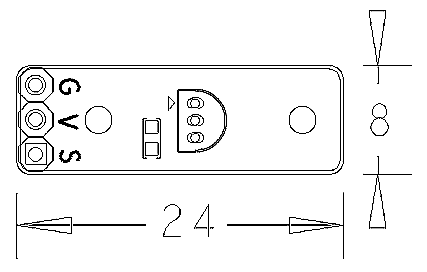Matrix - Temperature Sensor
Contents
1 Introduction
- The matrix-temperature_sensor module is used to measure temperature.
- We utilitze the DS18B20 chip with the To-92 package in this module. Its unique 1-wire interface requires only 1 port pin for reading/writing. Power for reading, writing, and performing temperature conversions can be derived from the data line itself with no need for an external power source. The DS18B20 can be powered from its data line. Each DS18B20 is assigned a unique ID.
- Its temperature range is -55 degree Celsius to +125 degree Celsius. The thermometer resolution is programmable from 9 to 12 bits. When the measured temperature is between -10 degree Celsius to +85 degree Celsius the accuracy can be at 0.5 degree. Among all three DS18B20 pins V is power, G is ground and S is data.
2 Features
- -55 degree Celsius to +125 degree Celsius
- One wire interface for communication
- Tiny, easy to be deployed in various situations
- 2.54mm spacing pin
- PCB dimension(mm): 8 X 24
- Pin Description:
| Pin | Description |
| S | GPIO |
| V | Power 5V |
| G | Ground |
3 Basic Device Operation
The core functionality of the DS18B20 is its direct-to-digital temperature sensor. The resolution of the DS18B20 is configurable (9, 10, 11, or 12 bits), with 12-bit readings the factory default state. This equates to a temperature resolution of 0.5°C, 0.25°C, 0.125°C, or 0.0625°C. Following the issuance of the Convert T [44h] command, a temperature conversion is performed and the thermal data is stored in the scratchpad memory in a 16-bit, sign-extended two’s complement format. The temperature information can be retrieved over the 1-Wire interface by issuing a Read Scratchpad [BEh] command once the conversion has been performed. The data is transferred over the 1-Wire bus, LSB first. The MSB of the temperature register contains the “sign” (S) bit, denoting whether the temperature is positive or negative.
4 Download Matrix Source Code
All the matrix modules' code samples are open source. They are maintained on GitHub - git://github.com/friendlyarm/matrix.git
Each branch in this hub contains the matrix modules' code samples for a board that the matrix modules can work with.
- The nanopi branch contains the matrix modules' code samples for the NanoPi
- The tiny4412 branch contains the matrix modules' code samples for the Tiny4412
- The raspberrypi branch contains the matrix modules' code samples for the RaspberryPi
Please follow the steps below to get the source code:
Install the git utility on a PC running Ubuntu14.04
$ sudo apt-get install git
Clone the matrix code from GitHub
$ git clone git://github.com/friendlyarm/matrix.git
If this is successful a "matrix" directory will be generated, which will contain all the matrix modules' code samples.
5 Connect to NanoPi
5.1 Preparations
Please install a Debian on a NanoPi and an appropriate cross compiler on a PC. Please refer to wiki: NanoPi
Compile a NanoPi kernel. Note: please use the kernel's source code from the nanopi-v4.1.y-matrix branch
$ git clone https://github.com/friendlyarm/linux-4.x.y.git $ cd linux-4.x.y $ git checkout nanopi-v4.1.y-matrix $ make nanopi_defconfig $ touch .scmversion $ make
5.2 Hardware Connection
Please refer to the following connection diagram to connect the Matrix-Temperature_Sensor module to the NanoPi

Connection Details:
| Matrix-Temperature Sensor | NanoPi |
| S | Pin7 |
| V | Pin4 |
| G | Pin6 |
5.3 Compile Test Program
Please login the matrix hub and enter the nanopi branch
$ cd matrix $ git checkout nanopi
Compile the matrix code
$ make CROSS_COMPILE=arm-linux- clean $ make CROSS_COMPILE=arm-linux- $ make CROSS_COMPILE=arm-linux- install
Note: please make sure to install the cross compiler "arm-linux-gcc-4.4.3" on your PC, which is used to compile files for the NanoPi-Debian.
Generated library files are under the "install/lib" directory. Applications are under the "install/usr/bin" directory. The test program for the "Matrix-Temperature_Sensor" module is "matrix-temperature_sensor".
5.4 Run Test Program
Please copy the library files and test program to the NanoPi
$ cp install/usr/bin/* nanopi_rootfs/usr/bin/ $ cp install/lib/* nanopi_rootfs/lib/ -d
Power on the NanoPi and run the following command in Debian's terminal
Note: this module is not plug and play therefore before running the module please make sure it is connected to a NanoPi.
$ matrix-temperature_sensor5.5 Code Sample
int main(int argc, char ** argv) { int devFD = -1; int pin = GPIO_PIN1; char *temperature = (char *) malloc(32); memset(temperature, 0, 32); if (argc == 2) { parseCmd(argc, argv, &pin); } else { printf("Using default pin GPIO_PIN1\n"); } if ((devFD = ds18b20Init(pin)) == -1) { printf("Fail to init ds18b20\n"); return -1; } if (ds18b20Read(temperature) > 0) { printf("Temperature = %s\n", temperature); } else { printf("Fail to get temperature\n"); } free(temperature); ds18b20DeInit(devFD); return 0; }
6 Connect to Tiny4412
6.1 Preparations
Please refer to the Tiny4412's user's manual to install a UbuntuCore on the Tiny4412 and install an appropriate cross compiler on a PC.
Note: only the Tiny4412SDK-1506 carrier board can work with this module.
6.2 Hardware Connection
Please refer to the following diagram to connect the Matrix-Temperature_Sensor to the Tiny4412

Connection Details:
| Matrix-Temperature Sensor | Tiny4412 |
| S | GPIO1 S |
| V | GPIO1 5V |
| G | GPIO1 GND |
6.3 Compile Test Program
Please login the Matrix hub and enter the matrix-tiny4412 branch
$ cd matrix $ git checkout tiny4412
Compile the matrix code
$ make CROSS_COMPILE=arm-linux-gnueabihf- clean $ make CROSS_COMPILE=arm-linux-gnueabihf- $ make CROSS_COMPILE=arm-linux-gnueabihf- install
Note: please make sure to install the cross compiler "arm-linux-gnueabihf-gcc-4.7.3" on your PC, which is used to compile files for the Tiny4412-UbuntuCore.
Generated library files are under the "install/lib" directory. Applications are under the "install/usr/bin" directory. The test program for the "Matrix-Temperature_Sensor" module is "matrix-temperature_sensor".
6.4 Run Test Program
Please copy the library files and test program to the Tiny4412
$ cp install/usr/bin/* tiny4412_rootfs/usr/bin/ $ cp install/lib/* tiny4412_rootfs/lib/ -d
Power on the Tiny4412 and run the following command in UbuntuCore's terminal
Note: this module is not plug and play therefore before running the module please make sure it is connected to a Tiny4412.
$ matrix-temperature_sensor6.5 Code Sample
int main(int argc, char ** argv) { int devFD = -1; int pin = GPIO_PIN1; char *temperature = (char *) malloc(32); memset(temperature, 0, 32); if (argc == 2) { parseCmd(argc, argv, &pin); } else { printf("Using default pin GPIO_PIN1\n"); } if ((devFD = ds18b20Init(pin)) == -1) { printf("Fail to init ds18b20\n"); return -1; } if (ds18b20Read(temperature) > 0) { printf("Temperature = %s\n", temperature); } else { printf("Fail to get temperature\n"); } free(temperature); ds18b20DeInit(devFD); return 0; }
7 Connect to RaspberryPi
8 Connect to Arduino
9 Resources

